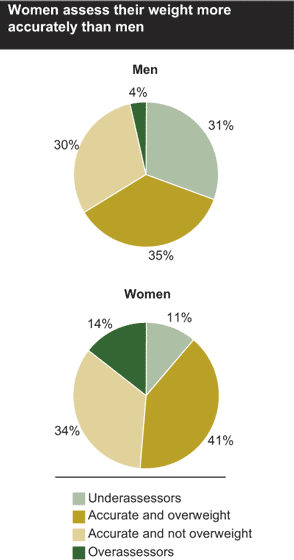What Weight Problem?
- by Fred Kuchler and Jay Variyam
- 9/1/2003
Suppose you were asked to classify your weight as either underweight, healthy weight, overweight, or obese. Do you think your assessment of your weight category would square with that of public health officials?
If it does, you are more realistic than many of us. According to a recent ERS analysis based on 1994-96 data, many American adults misidentify their weight category. Forty-one percent of individuals whom health professionals would classify as overweight, but not obese, did not perceive themselves to be overweight. Among those individuals whom professionals would classify as obese, 13 percent said that their weight is about right or even too low.
ERS researchers used self-reported heights and weights to calculate survey respondents’ Body Mass Indices (BMI—weight in kilograms divided by height in meters squared). Adults with a BMI of 30 or above are classified as obese by public health officials. Those with BMIs at or above 25 but less than 30 are classified as overweight. ERS researchers gleaned respondents’ perceptions of their own weight category by their answer to the survey question: Do you consider yourself to be overweight, underweight, or about right?
Why would economists be interested in a potential mismatch between individuals’ perceptions of their weight category and official classifications? It often falls to economists to determine the cost-effectiveness of potential government programs, such as public information campaigns. This research suggests that designing a campaign to combat overweight and obesity may be difficult because the public may need to be educated not only about the linkage between weight and health, but also about whether they are considered overweight or not.
The design of information programs may be further complicated by the finding that misperceptions of weight category appear to vary by gender and other demographic characteristics. For example, women who were overweight or obese according to official measures were more likely to say they are overweight than men—41 percent of women respondents versus 35 percent of men. Fourteen percent of women respondents (versus 4 percent of men) perceived themselves as overweight when they were not. Individuals who were overweight or obese and perceived themselves to be a healthy weight were more likely to be non-Hispanic Black or Hispanic than Asian or non-Hispanic White. ERS researchers found that accuracy in assessing weight category also varies with education, age, income, and diet and health knowledge.
This article is drawn from:
- Misperceptions in Self-Assessed Weight Status Vary Along Demographic Lines. (2002). USDA, Economic Research Service. FoodReview, Vol. 25, Issue 3, pp. 21-27..


